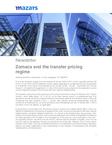
Zomacs and the transfer pricing regime
One of the questions arising from the analysis of Decree 1650 of 2017, which regulates articles 235 to 237 of Law 1819 of 2016 related to the tax regime applicable to companies that are incorporated or formalized in the Zones most affected by the armed conflict - Zomac - (hereinafter the "Zomac Decree"), is related to the application of rules of the transfer pricing regime to the operations carried out by companies located in the Zomacs with their national related parties.
The question arises due to the provisions of the anti-circumvention clause contained in the "Zomac Decree", which adds article 1.2.1.1.23.1.8. of the Sole Decree where it is established that "The operations carried out by the companies that have previously opted for the taxation regime of the new companies that start activities in the (...) -Zomac- with national economic related parties, shall be carried out at market prices, using the provisions and methodology set forth in articles 260-1, 260-3 and 260-4 of the Tax Statute, as applicable".
It would seem, at first sight, that "the Zomac Decree" would have modified article 260-2 of the Tax Statute by establishing a new group of taxpayers that, when carrying out operations with their national related parties, would be obliged to determine, for income and complementary tax purposes, their ordinary and extraordinary income, their costs and deductions, their assets and liabilities considering for those operations the Principle of Full Competence. If this were so, such modification of the law -via regulatory decree- would be null and void for contravening the principle of legality, since it could only be made by the legislator through an amendment to the tax law. However, from a more careful analysis of the matter, it can be concluded that there is no modification to the law through a regulatory decree, but simply establishes a new methodology for the valuation of transactions with domestic related parties, at market prices.
Considering the purpose of the regulation, under an exercise of teleological interpretation, it can be concluded that the purpose of this regulation is that the companies incorporated in the Zomacs carry out the operations with their national related parties at market prices, being able to use for this purpose the transfer pricing methodology or a different one (such as the one established in article 90 of the Tax Statute, which indicates the minimum values for which an asset may be disposed of for tax purposes). This can be concluded from the existence of the phrase "where applicable" contained in the rule under analysis.
That is to say, in the operations where the transfer pricing regime applies (which could be the case of a Zomac company that carries out operations with national related parties established in free zones), this regime would clearly apply and its violation could give rise to the imposition of sanctions established therein. On the contrary, in the case of Zomac companies that carry out operations with national related parties in which the transfer pricing regime does not apply, they will have to carry out such operations at market prices and may use the transfer pricing methodology or others and, if they do not do so, their sanction would be that derived from the recharacterization of the operation under the general anti-abuse or anti-circumvention clause, but never that derived from the non-compliance with the transfer pricing regime.
However, since the law does not provide that taxpayers located in the Zomac are required to prepare transfer pricing documentation for domestic transactions (unless the counterparty is located in a free trade zone), the proof that in a given transaction the transfer pricing provisions were not complied with should be in charge of the administration (the proof is incumbent upon the party alleging a fact).
Thus, these provisions will be a dead letter, since after thirteen (13) years of the transfer pricing regime in force, the administration has not performed the first substantive audit in which it questions, with its own analysis based on the law, that a transaction did not comply with the Full Competence Principle.


